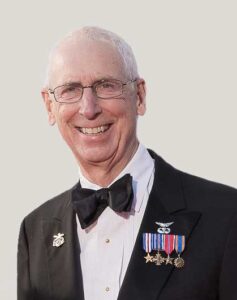 Helicopter Pilot in the “Helicopter War” — The War in Vietnam
Helicopter Pilot in the “Helicopter War” — The War in Vietnam
In the late 1960’s and early 1970’s almost all Americans participated in some way in the Vietnam war. We were either fighting in Vietnam, worried parents, brothers, sisters or spouses of those fighting, watching it on TV every night or resisting American participation in the war. Jay’s plan is to let us know about one young man’s year as a helicopter pilot in the heat of the battle in the war that was often referred to as “the helicopter war” due to the key role these versatile aircraft played in the war.
In 1968 US Army 1st Lieutenant Jay Dirnberger was assigned to the 1st Cavalry Division’s 227th Assault Helicopter Battalion. He served as a flight platoon leader and operations officer. Jay participated in the Tet Offensive in the city of Hue, the siege of Khe Sanh and the invasion of the Ashau Valley. He was awarded the Silver Star, Distinguished Flying Cross, Bronze Star, Air Medal with 22 oak leaf clusters and the Vietnamese Cross of Gallantry with Silver Star. Jay returned to the US as a captain and was assigned to the 18th Airborne Corp at Ft. Bragg (renamed Fort Liberty) where he was an aide to the commanding general. Jay left the service in November 1970.
Speaker Summary
Jay shared the very personal and real story of how he came to serve in Viet Nam, what his service entailed, the dynamics and role of his Huey helicopter unit, and their missions. His down-to-earth, tell-it-like-it-was approach resonated with the audience which included several DMA members who served in Viet Nam. It also provided insight and perspective for those who did not serve but to whom the Viet Nam War served as a key element in our lives given its role in the culture and politics of the late ‘60’s and early ‘70’s. Jay shared how a reunion of Viet Nam helicopter crews at an event 5 years ago at which he was interviewed for a Library of Congress documentary led him to create his talk to share his experiences.
Jay offered a theme about ordinary people from all walks of life being called to duty to create a team to meet and take on the challenges of war. It mattered not where you were from or what your background was, but what you could contribute to the team. And he emphasized how everyone doing their job and making it work was the critical element of success. His statistics on the number of lost helicopters (6000) and that 10% of the 58,000 U.S. lives lost in the war were helicopter crews put the danger of the work done by the helicopter corps in perspective.
Jay shared an almost naïve journey about how being a draftee right out of college destined to serve as a military postal clerk evolved into putting in for Officer Candidate School and then flight training with an underlying belief that the war would soon be over. Instead, he was deployed to Viet Nam arriving on January 1, 1968, just in advance of the TET Offensive. He then took us through a detailed but matter-of-fact discussion of a series of missions and what his job and those of his helicopter units entailed including the challenges offered by the terrain/geography, enemy fire, and the role of “luck” that sometimes spelled the difference between life and death.
He noted that the reason he (and others) did what they did was less about some sense of duty to our country but out of duty to the men fighting on the front lines who depended on the helicopter units to bring them in and, generally more harrowingly, out from the battles they were fighting. He also shared his thoughts on how the rotational nature of the crews constantly coming and going negatively impacted the cohesion of the teamwork so critical to the success of the teams. Throughout, his focus on teamwork, cohesion, coming together and doing your job were common themes for success.
While Jay spent little time talking about the feelings of those serving as it pertained to the broader cultural and political perspectives in the country at the time, during the ensuing Q & A he shared some thoughts about this including how his arrival back home from his service felt somewhat hollow for the lack of appreciation and homecoming welcome experienced by those who served in other wars.
Video presentation to the DMA. We apologize to our speaker for the technical issues
Video Presentation to Y’s Men of Westport and Weston in 2023
